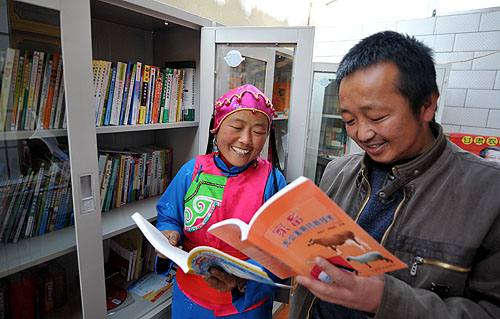|
 |
|
MORE OPTIONS: The government hopes to enrich farmers' cultural life through bigger subsidies (NIE JIANJIANG) | Forced Cigarettes
Recently, the government of Gongan County in central China's Hubei Province issued a notice, publishing the quantity of cigarettes that local government departments were required to consume within a year. According to the notice, the government workers should consume 23,000 cartons of locally made cigarettes every year, worth about 4 million yuan ($580,000). Those departments that failed to meet the quota would have their budgets reduced in the coming year, said the notice.
But who will pay for this cigarette consumption? The county government said it would not allocate funds to pay for the bills. All departments will have to either conceal them within other budget items or pass on the cost to local residents, adding to the taxpayers' burden.
The county government explained that it was mandating employees to consume more locally made cigarettes to help their producers during the financial downturn. However, it totally neglects the corruption and public complaints this policy will invite. The government-paid cigarette consumption will first damage the government's image before it helps boost the local economy.
Dazhong Daily
Why Reward Civil Servants?
A real estate company in Tianjin recently offered discounted apartments to civil servants in a local district government, saying that it does so out of gratitude for the district government's efforts to build roads and other public infrastructure.
There are many cases of civil servants, particularly officials, trading power for personal gains. This time, the company offered a reason for the bribe: It wanted to thank the government for road and infrastructure construction.
But the budget for public infrastructure construction comes from tax revenue. If the company really wanted to thank someone, it should be taxpayers. Why does the company provide discounted apartments only to civil servants?
Many property developers believe that the government has all the decision-making power in construction projects and does not need to consult the public at all. Thus we can't help asking, of all the construction projects, how many are the result of biddings and to what extent does the government listen to public opinion?
We have seen too many construction projects that were strongly opposed by the public but were still pushed forward by the government. Average taxpayers should no longer remain voiceless on this issue.
China Youth Daily
Small Input Does No Favors
Yunnan Province in southwest China recently announced that the provincial budget would subsidize cultural activities in rural areas in the amount of 0.5 yuan ($0.07) per capita annually. According to Yunnan's cultural development program, by 2010, every farmer in the province will read one book every year and watch a drama every three months, and every village will establish an art performing troupe.
In the past few years, China has constantly increased its input into farmers' cultural activities. In 2007, the budget for this purpose totaled 5.6 billion yuan ($800 million), up 25.9 percent from the previous year. However, since the country has 900 million farmers, this worked out to only 6.2 yuan (less than $1) per capita among the rural population. Even if this growth rate continues, per-capita input will stand at only 10 yuan ($1.4) by 2010.
Nowadays, it's not easy to find books priced below 10 yuan. So Yunnan's subsidy seems insufficient to realize the objective of "one book a year" for farmers. It was proposed that the subsidy should be concentrated on big projects in several villages. But that would only enrich the cultural life of a small number of farmers.
Farmers and vast rural areas urgently need public cultural facilities and diverse cultural activities. It is necessary for governments at various levels to further increase input for this purpose. Meanwhile, efforts should be made to prevent these limited funds from being embezzled.
Dazhong Daily
Facilities Should Follow
Visitors at Taiyuan Zoo in north China's Shanxi Province had a tough time over the May Day holiday. The zoo was very crowded. By noontime, visitors had nowhere to sit but the grass or the cement ground. Apart from the shortage of rest areas, in some scenic spots toilets were not enough or were not properly maintained. All this implies the inadequacy of public infrastructure in scenic spots.
Facing an economic downturn, local governments are distributing travel coupons and reducing or even scraping admission fees for some scenic spots. These measures have paid off. According to official statistics, during the three-day May Day holiday, 27 major scenic spots in Shanxi received a total of 513,300 visitors, up 12.3 percent year on year. But if they are relying on tourism to boost consumer spending, local governments have to spend more to accommodate tourists.
Nowadays, a growing number of people are showing interest in tourism, and more holidays make travel possible. With all scenic spots expecting an increase in visitors, it's important for governments at various levels to focus on not only tourism revenue but also service quality. As a result, tourists can have more fun in a more comfortable environment.
Qilu Evening News | 